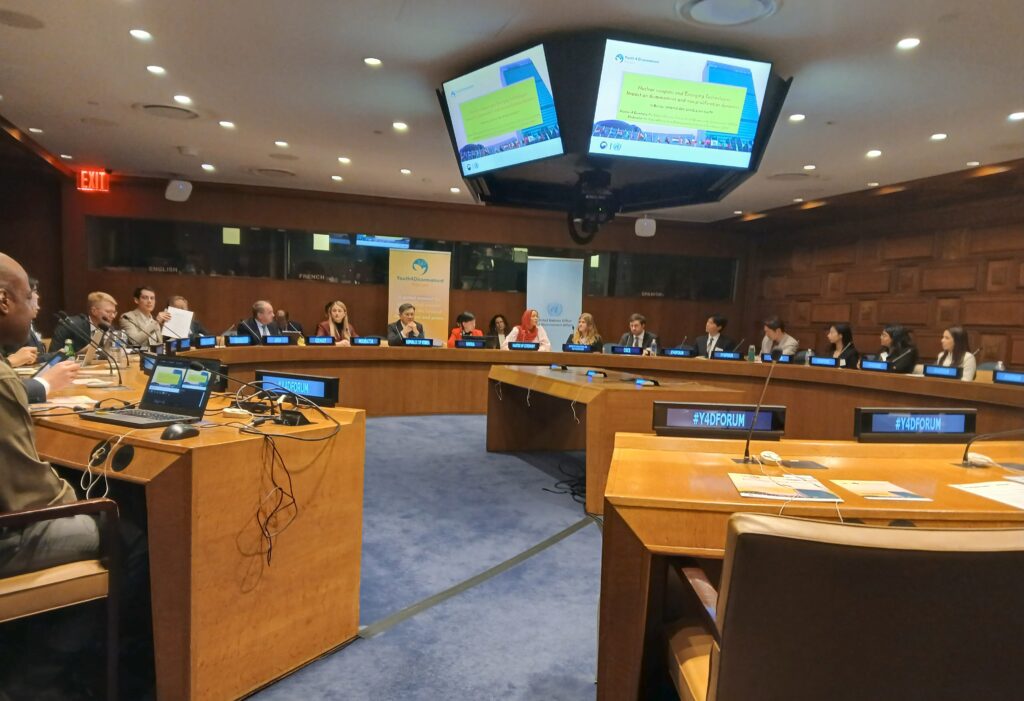Overview and context
The United Nations Office for Disarmament Affairs (UNODA) convened the first-ever UN Youth4Disarmament Forum at UN Headquarters, New York, on 16–17 October 2025, timed to coincide with the GA First Committee’s eightieth session. The Forum’s central theme was the nexus between nuclear weapons and emerging technologies particularly AI and cyber framed as both a risk multiplier and a policy opportunity for long-term arms control and disarmament. UNODA announced and profiled the Forum as a flagship Youth4Disarmament (#Y4D) milestone.
Proceedings and structure
The High-Level Opening Session on 16 October set the tone, grounding youth participation in the UN’s existing Youth, Peace and Security architecture (SC res. 2250, 2419, 2535) and linking it to concrete disarmament tracks. UNODA High Representative Izumi Nakamitsu delivered opening remarks, underscoring the Forum’s purpose and the urgency of its theme. She stressed the acceleration of technological change and its security implications, as well as sustained increases in global military spending, which the Secretary-General recently estimated at US$2.7 trillion in 2024 a trend she called “alarming” because each dollar diverted to arms is a dollar not spent on education, climate action, health and human rights.
Across plenary and breakout formats (“Forum crews”), participants examined: (i) risk pathways at the nuclear–AI–cyber frontier; (ii) transparency, verification and confidence-building measures adapted for emerging tech; and (iii) mechanisms to institutionalise meaningful youth participation in disarmament fora. UNODA’s public materials and the opening statement highlighted that the Forum would feed youth insights directly into Member State deliberations taking place in the First Committee.
Key statements and takeaways
1.From the United Nations (UNODA)
In her opening statement, Ms. Nakamitsu welcomed participants to “this first ever UN Youth4Disarmament Forum—a landmark gathering that brings us together to explore the critical intersection between nuclear weapons and emerging technologies.” She thanked the Government of the Republic of Korea for its support and pointed to the cost of rising military expenditure: “Behind each dollar spent on weapons lies a missed opportunity: funds taken away from education, climate action, human rights, health and other pillars of lasting peace and sustainable development.” She urged that “meaningful youth participation in multilateral discussions must become the norm, not the exception,” and proposed the Forum convene regularly, ideally every other year, to take stock and shape policy.
These remarks framed youth not as observers but as co-creators of policy, with UNODA signalling expanded mentorships and fellowships through Youth4Disarmament to place young experts “side by side with diplomats, scientists and civil society.” The statement also previewed a youth-driven outcome document as a deliverable of the two-day programme.
2. From Member States
Republic of Korea (ROK) — Opening remarks delivered by Ambassador Sangjin Kim, Deputy Permanent Representative of the ROK to the UN, emphasised the national experience of investing in youth as a driver of societal progress. Citing Korea’s own trajectory, he said: “The ROK has vivid experiences and a history that attest to the importance and value of investing in youth, our future generation… Investment in youth, through education and empowerment, has been the true driving force behind the Korea we know today.” The ROK’s support was also acknowledged by UNODA as enabling the Forum.
3. From civil society and youth networks (NGOs/IGOs)
CTBTO Youth Group (CYG) and allied youth networks signalled their participation, positioning the Forum as a venue to elevate youth voices in non-proliferation and to connect technology governance with nuclear risk reduction. CYG highlighted representation at UNHQ during the Forum and reaffirmed its mission of ensuring youth have a “seat at the table” in CTBT processes. While these posts are not formal speeches, they reflect the tenor of civil-society interventions over the two days: calls for tangible inclusion pathways; emphasis on verification, transparency and risk-reduction in the AI/cyber era; and the importance of sustained youth pipelines into technical and policy roles.
Substantive themes
- Nuclear risk in an AI-enabled world
Participants examined pathways by which AI and cyber operations can destabilize nuclear command, control and communications (NC3) and crisis decision-making, and discussed governance approaches—standards, testing, transparency and incident-reporting—that could be adapted for nuclear risk-reduction. UNODA flagged that many of these themes run in parallel to Member State debates in the First Committee, encouraging cross-pollination of ideas. - Rebalancing security spending
With military expenditure at US$2.7 trillion (2024), speakers argued for redirecting portions of defence outlays toward education, climate, and public health, in line with recent Secretary-General messaging and UNODA’s advocacy. The Forum positioned youth as accountability partners in tracking the opportunity costs of arms racing. - Institutionalising youth participation
Building on Security Council YPS resolutions and GA practice, the Forum explored durable modalities—youth fellowships, rotating youth seats on expert groups, and biennial convenings, to make participation structural rather than ad hoc. UNODA’s commitment to expand mentorships and fellowships was noted as an actionable next step.
Deliverables and next steps
UNODA signalled a youth-drafted outcome document capturing recommendations on technology governance, risk reduction, and participation frameworks; Ms. Nakamitsu stressed that these insights should be fed directly into Member State discussions underway in the First Committee.
Assessment
As a first-of-its-kind event, the Youth4Disarmament Forum successfully bridged youth expertise and formal multilateral processes, especially valuable during a First Committee session tasked with grappling with rapid technological change. The inclusion of Member State voices, most prominently the ROK’s sponsorship and opening remarks, gave the youth dialogues political traction. Civil-society and youth networks added momentum by foregrounding participation, verification and transparency themes, aligning with UNODA’s broader push for innovation-driven multilateralism.




